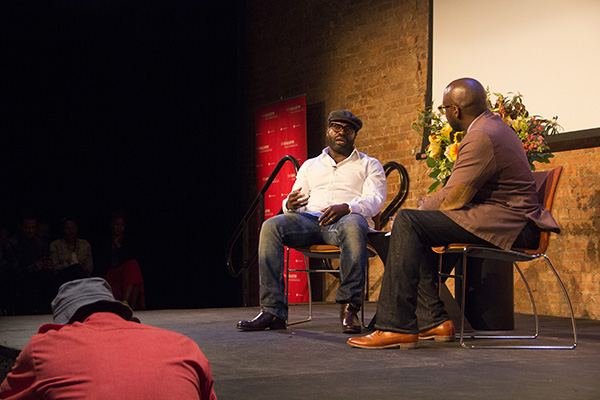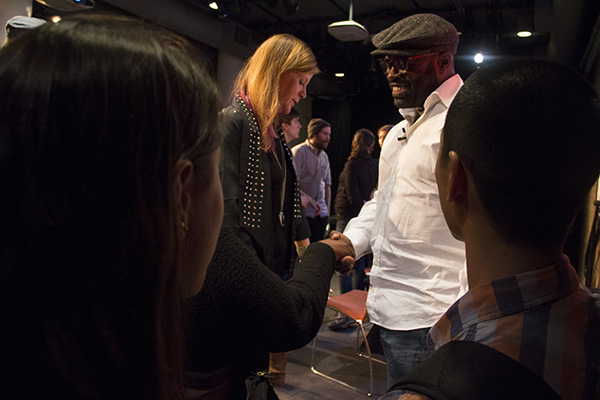
The Gallatin School of Individualized Study hosted a talk with Tarik Trotter yesterday evening in the Jerry H. Labowitz Theatre for the Performing Arts.
Millery Polyne, associate professor of African-American and Caribbean History at Gallatin, hosted the conversation. The mood was kept very light, and the talk moved much like a conversation between two friends.
Also known as Black Thought, Trotter spoke frankly about what his life while growing up in Philadelphia.
“I was into visual arts at the age of three, and I knew my trajectory would be me creating things with my hands,” Trotter said. “When I was nine I did my first talent shows, rapping with Beanie Sigel, a grafitti guy, stance dude and a beat box guy.”
Trotter loved the musical side of high school, skipping his visual arts classes and spending time with music majors.
“If I was married to visual arts, music was becoming my mistress,” he said.
It was during high school that Trotter met his drummer bandmate, Ahmir “Questlove” Thompson.
“He had a Casio keyboard and walked around sampling beats and recording voices on that thing,” Trotter said. “Questlove was like the pied piper, and I followed him around.”
From there, Trotter’s stage name began to develop and evolve, from Double T to DT Rock, MC Apex, T Metaphor and finally HAWK Smooth, which he said stood for “Hype African Warrior Kickin’ it Smooth,” before choosing Black Thought.
“Black Thought is a nod to the visual arts side of my history,” Trotter said. “On a pallette you have to mix all the colors in the right amounts to get black,” he said. “The mix of the right amount of everything speaks to who I am as an artist.”
In May of this year, The Roots were celebrated in a mural in their hometown dedicated by the Philadelphia Mural Arts Program. In his tale of how the program was started, Trotter said the program was once for kids caught tagging. Most were sentenced to 250 hours of scrub duty to remove the graffiti.
“I was once one of those kids, got caught and had scrub duty,” Trotter said. “When I think about it, there is irony in this mural. Full-circle irony.”

When asked about the creative process behind making music, Trotter described times when musicians would jam together during a studio session in the same room for days.
“If I had my choice, its how I would continue to create,” Trotter said. “There’s not enough time or money for that now.”
The Roots have been an influential band since the late 1980s, when they were known as Square Roots and performed around Philadelphia.
“We are ever evolving, becoming more efficient as producers, and becoming more conscious as writers,” Trotter said.
The Roots are currently working on a new album with the working title “& Then You Shoot Your Cousin.” They are also the house band for “Late Night With Jimmy Fallon” and will move with him when he begins hosting “The Tonight Show.”
The discussion with Trotter was part of the Albert Gallatin Lecture series, which has been presented since 2006 by a student-driven committee. Music critic Robert Sheffield and Gallatin Professor Rosalind Fredericks were lecturers in last year.
“I want to know about the minds behind hip-hop,” said Destiny Arturet, a second-year graduate student in Gallatin.
Graduate School of Arts and Science alumna Alexsandra Mitchell said she stopped at the event by chance.
“It was authentic and it fed me,” Mitchell said. “It fed the part of my Philly spirit.”
Aziza Ingram is a contributing writer. Email her at [email protected].

























































































































































